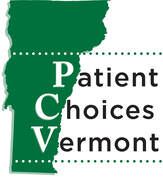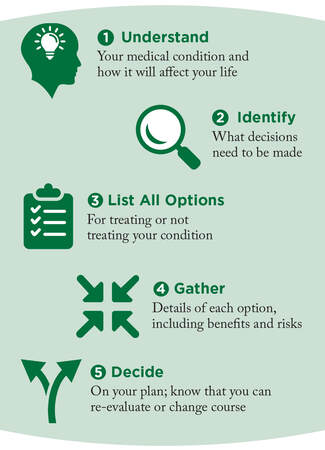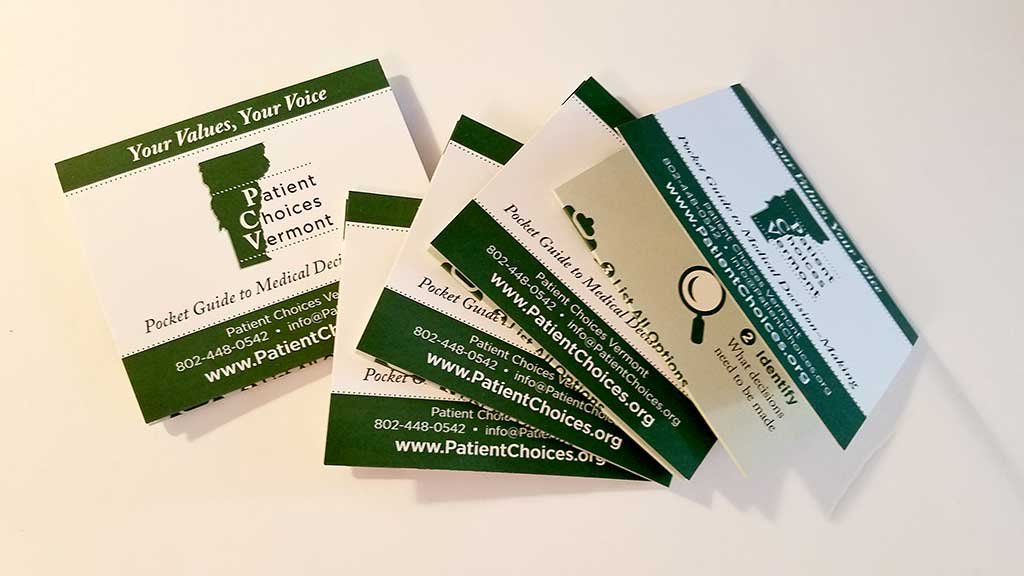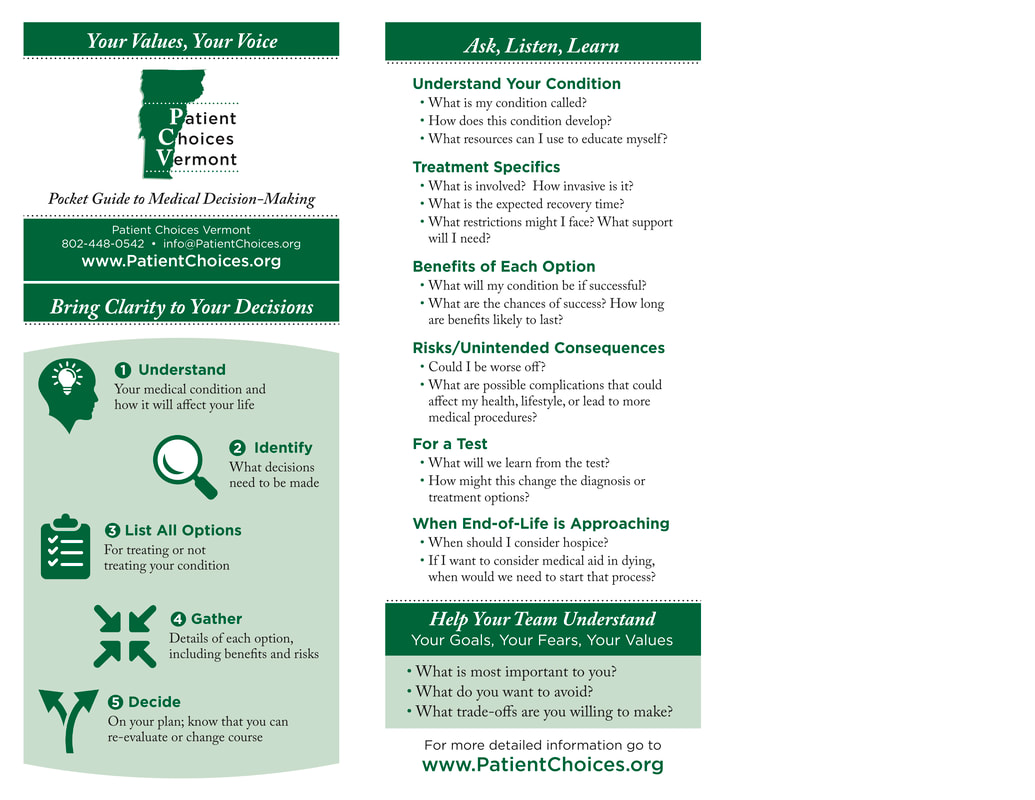PCV Guide to Medical Decision-Making
Your Values, Your Voice...Making Decisions in Cases of Serious Illness

Medical professionals are required to provide patients with all of the information about their medical condition and to make sure that patients are fully informed before making decisions about their treatment. In cases of serious illness, there may be a number of options for treatment and care. If you want to make sure that your treatment plan is consistent with your goals and your values, then having a clear process for communication will help.
The diagram below provides a five-step decision-making process starting with understanding your condition. Please see the section below for questions you can ask at each step of the way. You may download PCV's Pocket Guide to Medical Decision-Making further down on this page or contact us for copies to be sent to you.
The diagram below provides a five-step decision-making process starting with understanding your condition. Please see the section below for questions you can ask at each step of the way. You may download PCV's Pocket Guide to Medical Decision-Making further down on this page or contact us for copies to be sent to you.
Bring Clarity to Your Decisions

1. Understand: Receiving a serious diagnosis can be challenging. In understanding your condition, you can ask your doctor to provide information at whatever level of detail you are comfortable with.
2. Identify: Next, it is helpful to identify what decisions need to be made. Focusing on the priority decisions can help you navigate serious illness.
3. List All Options: Listing all the options is a very important step. Your doctor may have already considered a range of options and be presenting the recommended choice. The way to know if this is the best choice for you is to understand the whole range of options. You may want to know, for example, how your condition will develop if you decline treatment or choose a less invasive but possibly less effective treatment. Or there may be upcoming events or timing that is important to you.
4. Gather: Some people want all the details involved in treatment options. Others want to rely more heavily on their doctor's advice. Think about where you are on this spectrum. At the very least, make sure you understand the trade-offs and the care you will need during and after treatment.
5. Decide: Often it's a relief to make a decision on a plan. Know that you can set a milestone with your doctor at which you will evaluate and consider changes.
2. Identify: Next, it is helpful to identify what decisions need to be made. Focusing on the priority decisions can help you navigate serious illness.
3. List All Options: Listing all the options is a very important step. Your doctor may have already considered a range of options and be presenting the recommended choice. The way to know if this is the best choice for you is to understand the whole range of options. You may want to know, for example, how your condition will develop if you decline treatment or choose a less invasive but possibly less effective treatment. Or there may be upcoming events or timing that is important to you.
4. Gather: Some people want all the details involved in treatment options. Others want to rely more heavily on their doctor's advice. Think about where you are on this spectrum. At the very least, make sure you understand the trade-offs and the care you will need during and after treatment.
5. Decide: Often it's a relief to make a decision on a plan. Know that you can set a milestone with your doctor at which you will evaluate and consider changes.
Help Your Medical Team Understand - Your Goals, Your Fears, Your Values
Your doctor may ask you questions like these:
It is helpful to have thought through your views and be prepared to share them with your doctor. If your doctor doesn't ask questions like these, you can use these as a guide to help you communication your goals, your fears and your values.
Ask, Listen, Learn
These are questions you can ask to help you navigate the decision-making process. The key questions are included on PCV's Pocket Guide to Medical Decision-Making, which you can download below or request in the mail.
Your doctor may ask you questions like these:
- What are your most important goals if your health situation worsens?
- What are your biggest fears and worries about the future with your health?
- What gives you strength as you think about the future with your illness?
- What abilities are so critical to your life that you can’t imagine living without them?
- If you become sicker, how much are you willing to go through for the possibility of gaining more time?
- How much does your family know about your priorities and wishes?
It is helpful to have thought through your views and be prepared to share them with your doctor. If your doctor doesn't ask questions like these, you can use these as a guide to help you communication your goals, your fears and your values.
Ask, Listen, Learn
These are questions you can ask to help you navigate the decision-making process. The key questions are included on PCV's Pocket Guide to Medical Decision-Making, which you can download below or request in the mail.
|
Understand Your Condition:
|
Benefits of Each Options:
|
Cultivate Strong Communications
To help make sure that you understand each piece of information, tell your doctor that you want to repeat back your understanding in your own words and make sure that it's accurate. Take notes or have a friend or family member at medical visits to take notes for you. Feel free to ask your doctor to repeat information.
PCV Pocket Guide to Medical Decision-Making
Patient Choices Vermont is pleased to offer our Pocket Guide to Medical Decision-Making.
To help make sure that you understand each piece of information, tell your doctor that you want to repeat back your understanding in your own words and make sure that it's accurate. Take notes or have a friend or family member at medical visits to take notes for you. Feel free to ask your doctor to repeat information.
PCV Pocket Guide to Medical Decision-Making
Patient Choices Vermont is pleased to offer our Pocket Guide to Medical Decision-Making.
We designed the guide to be a concise reminder of important questions to ask and information to convey to your medical and care team. In its printed form, the folded guide fits in your purse or pocket. Please contact us to request printed copies for yourself or to distribute in your community.
A number of recent books delve into the problems patients face when the medical system assumes that extending life with more tests and more procedures is always the right approach, not necessarily with regard to the patient’s own priorities. Please see the the PCV Reading List.
While reading these books, you can’t help but ask, “How would I approach decision-making if I were faced with the complexity and emotional challenges of serious illness? How can I make sure that my priorities are the primary consideration?” The PCV team looked for resources to help patients navigate decision-making and enhance communication with their doctors. Surprisingly, we found coaching materials for doctors to have these conversations but no concise resource for patients. So we developed our own.
For a one-sheet, printable version, you may download the PDF file provided below.
A number of recent books delve into the problems patients face when the medical system assumes that extending life with more tests and more procedures is always the right approach, not necessarily with regard to the patient’s own priorities. Please see the the PCV Reading List.
While reading these books, you can’t help but ask, “How would I approach decision-making if I were faced with the complexity and emotional challenges of serious illness? How can I make sure that my priorities are the primary consideration?” The PCV team looked for resources to help patients navigate decision-making and enhance communication with their doctors. Surprisingly, we found coaching materials for doctors to have these conversations but no concise resource for patients. So we developed our own.
For a one-sheet, printable version, you may download the PDF file provided below.
| PCV Pocket Guide to Medical Decision-Making |
More Resources
Patient Choices Vermont provides the following guides:
Patient Choices Vermont provides the following guides:
- A Vermonter's Guide to End-of-Life Decision Making: Provides a concise outline of the basic requirements of Act 39.
- How to Talk to Your Doctor: Discusses the importance of early conversations with your doctor if you may be interested in medical aid in dying under Act 39 and offers suggestions on how to have those conversations.
- Frequently Asked Questions: Addresses questions that people often ask about Act 39 and includes a glossary of commonly used terms related to end-of-life choice.
- Guide to Advance Care Planning for Dementia: Offers directives that can be included in advance directives to address the possibility of dementia.
- PCV Helpline: Go to our Contact Page.


